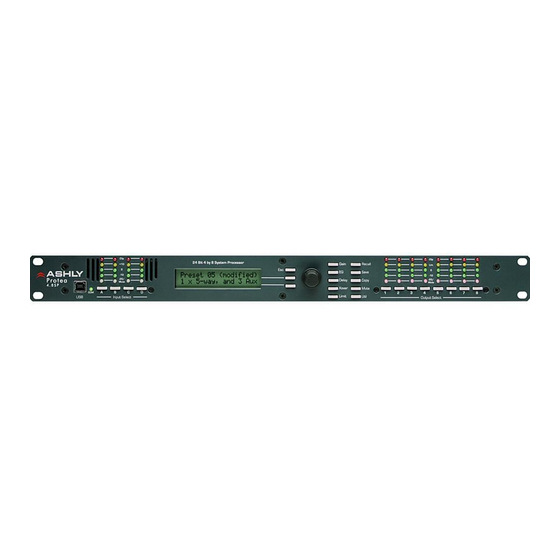Ashly Protea 3.6SP Bedieningshandleiding - Pagina 4
Blader online of download pdf Bedieningshandleiding voor {categorie_naam} Ashly Protea 3.6SP. Ashly Protea 3.6SP 16 pagina's. 24 bit system processor

Operating Manual - PROTEA 4.8SP and 3.6SP System Processors
1. INTRODUCTION
Thank you for your purchase of this Ashly Protea 4.8SP or 3.6SP Digital Crossover/System
Processor. The Protea series builds on the tradition of quality and value which has earned Ashly its
place as a market leader in crossovers, equalization, and signal processing.
The 4.8SP has four inputs and eight outputs, while the 3.6SP has three inputs and six outputs.
The front panel interface allows quick access to all control parameters by offering dedicated function
buttons, eliminating the need for hidden sub-menus. For even faster set-ups and stronger visualization
of Input/Output routing, EQ, and Filter curves, a USB port is provided for use with Windows™ Protea
NE Software. Full control by third party controllers is also available via RS-232.
FCC COMPLIANCE:
This device complies with part 15 of the FCC Rules for class A operation, and is subject to the following two conditions:
1. This device may not cause harmful interference
2. This device must accept any interference received, including interference that may cause undesired operation.
1.1 AUDIO FEATURES
The Protea 4.8SP and 3.6SP utilize state of the art DSP technologies, beginning with 24 bit, 48kHz delta-sigma
A/D converters with 128x oversampling. Digital processing includes Gain, Parametric EQ, Shelving Filters, Time Delay,
Crossover Functions, Compression, Limiting, and Matrix Routing, all taking place in twin 120MHz Motorola DSP56362
high performance DSP processors. D/A conversion uses 24 bit delta-sigma converters with 128x oversampling. All
inputs and outputs are precision balanced and RF protected using XLR connectors.
1.2 USER INTERFACE
Front Panel Interface: A backlit 2 x 20 character LCD displays channel and function settings. Dedicated
buttons provide access to all audio functions and system tools. The display indicates the current preset number, then
subsequently shows the selected input or output and its active control parameters. Five segment LED arrays on each
input and output provide audio level information and mute status.
Protea NE Software: The computer interface uses Ashly PROTEA NE SOFTWARE for Windows, which allows
complete PC control of the unit through a USB jack. Protea NE software is supplied with each unit, or can be down-
loaded at no cost from the Ashly web site. Advantages of using the software include greater preset capacity, and a very
intuitive visual representation of the audio routing and control process.
2. UNPACKING
As a part of our system of quality control, every Ashly product is carefully inspected before leaving the factory
to ensure flawless appearance. After unpacking, please inspect for any physical damage. Save the shipping carton and
all packing materials, as they were carefully designed to minimize the possibility of transportation damage should the
unit again require packing and shipping. In the event that damage has occurred, immediately notify your dealer so that
a written claim to cover the damages can be initiated. The right to any claim against a public carrier can be forfeited if
the carrier is not notified promptly and if the shipping carton and packing materials are not available for inspection by
the carrier. Save all packing materials until the claim has been settled.
3. AC POWER REQUIREMENTS
Note: The AC power switch is on the back panel. The Protea 4.8SP and 3.6SP use a universal input power
supply which will accept any line voltage in the range of 100VAC to 240VAC, 50-60Hz. A standard IEC-320 grounded
AC inlet is provided on the rear panel to accept the detachable power cord. Never remove the AC earth ground
connection to the unit. In the event of fuse failure, refer the product to a qualified service technician for fuse replace-
ment, replacing only with the same type and rating fuse.
4
